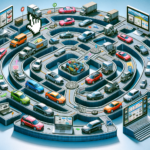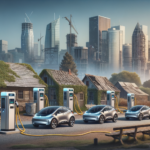The Evolution of Home Appliances
Since the dawn of the 20th century, home appliances have been pivotal in transforming domestic life. From the introduction of the electric iron to the development of smart refrigerators, the journey of these gadgets is a testament to human ingenuity. Initially, appliances were simple mechanical devices aimed at reducing manual labor. However, with the advent of electricity, these devices underwent a revolutionary change, becoming more efficient and user-friendly.
In recent years, the integration of technology has further accelerated this evolution. Today’s appliances are not just about functionality but also about enhancing the quality of life. For instance, modern washing machines come equipped with sensors that optimize water usage, thus promoting sustainability. Meanwhile, smart ovens can be controlled remotely, allowing users to start cooking even when they are not at home.
This transformation reflects the broader trend of digitalization, where connectivity and smart features are becoming standard. As we look forward, the future of home appliances seems promising, with innovations focusing on energy efficiency, automation, and artificial intelligence.
Smart Technology: The Heart of Modern Gadgets
Smart technology has become the cornerstone of contemporary gadgets, transforming them into intelligent devices that adapt to our needs. The Internet of Things (IoT) has played a crucial role in this transformation, enabling appliances to communicate with each other and with users, creating a seamless and integrated living environment.
Take, for example, the smart thermostat, which learns your heating preferences and adjusts itself accordingly, ensuring comfort while saving energy. Similarly, smart lighting systems can be programmed to mimic natural light patterns, enhancing mood and productivity.
Moreover, these technologies offer unprecedented convenience. With voice-activated assistants, controlling home appliances is as easy as speaking a command. This level of integration not only simplifies daily tasks but also enhances accessibility for individuals with disabilities, making smart technology a game-changer in the realm of home appliances.
Sustainability and Energy Efficiency
As environmental concerns rise, the demand for sustainable and energy-efficient appliances has grown significantly. Today, many manufacturers are focusing on reducing the carbon footprint of their products, aligning with global efforts to combat climate change.
Energy-efficient appliances, such as refrigerators with inverter technology and LED lighting, consume less power, resulting in lower electricity bills and reduced environmental impact. Additionally, water-saving features in dishwashers and washing machines contribute to conserving this precious resource.
Furthermore, some appliances are designed to be recyclable, minimizing waste and promoting a circular economy. These advancements reflect a shift in consumer preferences towards eco-friendly products, encouraging manufacturers to innovate and prioritize sustainability in their designs.
The Role of Design in Modern Appliances
In the world of contemporary gadgets, design plays a crucial role in influencing consumer choices. Modern appliances are not just about functionality; they are also about aesthetics and how they fit into the overall home environment.
Today’s consumers seek appliances that complement their home decor, leading to a surge in demand for sleek, minimalist designs. Many manufacturers are responding by offering products with customizable features and finishes, allowing users to tailor their appliances to their personal style.
Moreover, design innovation extends to user interfaces, with touchscreens and intuitive controls becoming increasingly common. These features enhance the user experience, making appliances more accessible and enjoyable to use. As design continues to evolve, it will undoubtedly remain a key factor in the development of future home appliances.
The Future of Home Appliances
Looking ahead, the future of home appliances is poised to be shaped by technological advancements and changing consumer needs. Emerging technologies such as artificial intelligence and machine learning are likely to play a significant role in the next generation of appliances, making them smarter and more autonomous.
For instance, AI-powered refrigerators could suggest recipes based on available ingredients, while robotic vacuum cleaners could map and clean homes more efficiently. Additionally, as the smart home ecosystem expands, interoperability between devices will become increasingly important, ensuring a seamless user experience.
As we continue to embrace digitalization, the possibilities for innovation in home appliances are endless. The focus will likely remain on enhancing convenience, energy efficiency, and sustainability, ensuring that these gadgets continue to enrich our lives in meaningful ways.








